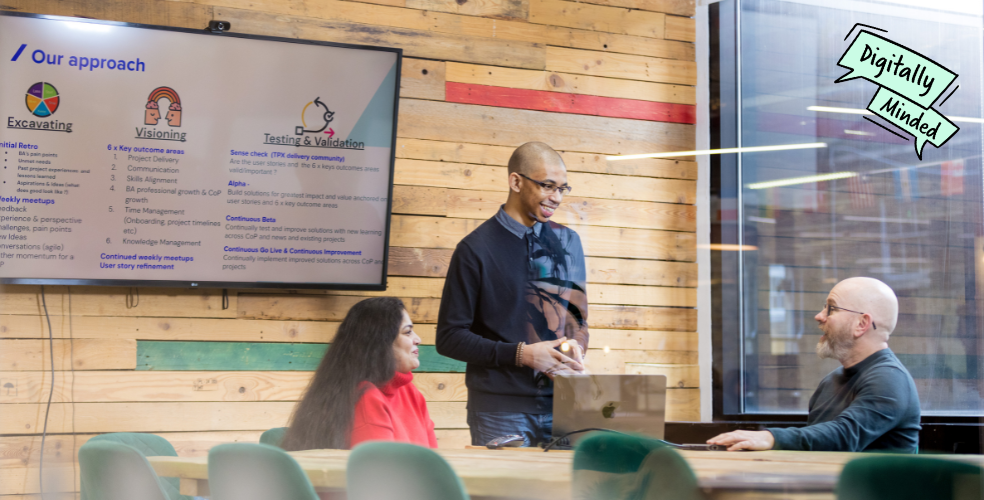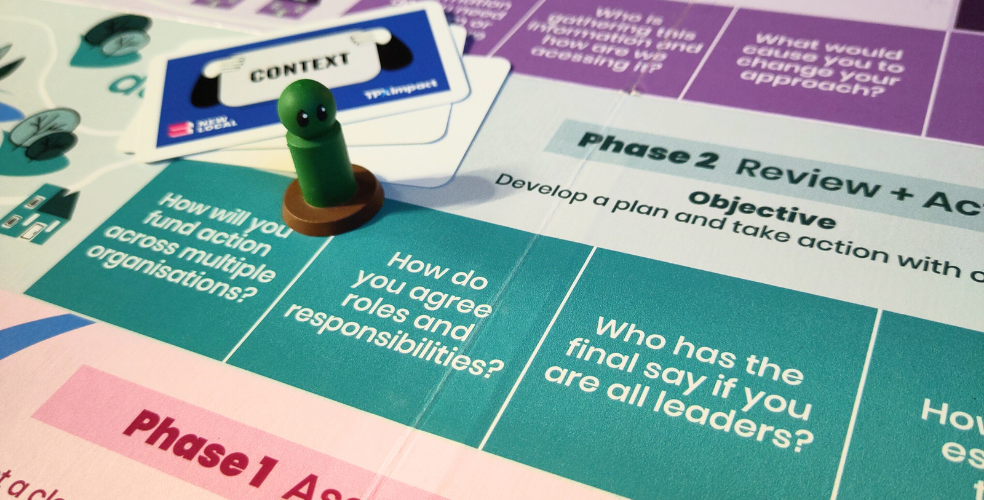Imagine you're the CEO of a local council, and in just six weeks, a series of flash floods devastate your area. More than 10,000 homes, along with critical infrastructure, are severely damaged. Temporary housing solutions are quickly overwhelmed by displaced residents. How do you respond?
This was the challenge we posed to a group of leaders from across local government in Radical Leaders: The Game!, part of the Radical Leaders event we hosted with New Local. This overnighter brought together a variety of senior individuals to spend 24 hours reflecting on their leadership and how it’s changing.
We designed the game to bring to life the real-world pressures facing public sector leaders in a time of perma-crisis while encouraging players to consider a more collaborative and radical leadership style.
The need for radical leadership
Local governments are facing unprecedented challenges. Whether it’s climate change, inequality, or pressures on services, these all demand action and a new way of thinking if we’re to address them. In the past few years, particularly during the COVID-19 pandemic, we’ve seen glimpses of what radical leadership can achieve—collaborations across sectors, agile decision-making, and community-centred approaches. Yet, in the busy day-to-day life of local government, finding the space to reflect and grow into this role can be difficult.
This is where the idea for Radical Leaders, and our game, came from. At TPXimpact, we’ve long understood the value of creating experiential learning opportunities and thinking outside the box. This is why we designed a game that allows senior leaders to step out of their usual roles and practise radical leadership in a safe, yet extreme, perma-crisis scenario.
Designing the game: From prototype to play
The design process for Radical Leaders: The Game, done in partnership with New Local and the NeuroLeadership Institute, was collaborative and iterative. We started with a simple, low-fi paper prototype that we played with colleagues. Each time we tested it, we refined the scenarios and prompts to ensure they reflected real-world challenges.
We used a board game format, complete with scenario prompts, cards, and a newspaper containing critical information about the crisis each team faced. Participants were randomly assigned a scenario—whether it was flash flooding, a prolonged drought, a mental health crisis, or a national fuel shortage. They were then tasked with leading their own local authorities, as well as working with neighbouring councils, to get through the first 100 days of the crisis.
Radical leadership in action
What made the game unique is that it simulated not just the operational challenges of crisis management, but also the behavioural shifts required for radical leadership. The core tenets of this approach—collaboration, agility, and deep community engagement—were embedded in the game’s mechanics. Leaders have to make decisions that prioritise the collective good, working together to solve the problems as a unified group.
Participants took turns moving along the board, responding to prompts including "how will you fund action across multiple organisations?" and "how will you make a final decision if you are all leaders?" that asked them to make difficult decisions under time pressure. They were given context cards that introduced complexities, such as media scrutiny or public unrest, and power-up cards that represented leadership traits they must embody during the discussions. The game wasn’t just about solving the crisis at hand—it was about how leaders respond under pressure, how they collaborate, and how they adapt to new information and challenges.
One of the key frameworks we integrated into the game was the SCARF model, which encourages players to reflect on five key domains: status, certainty, autonomy, relatedness, and fairness. At several points, participants were asked to prioritise these domains based on the decisions they made, encouraging them to consider how their leadership behaviours align with these values.
Bringing radical leadership to life
The feedback from those who played was overwhelmingly positive. Many found the experience to be both powerful and thought-provoking. It allowed them to explore new ways of leading in a safe environment, free from the constraints of their day-to-day responsibilities. Playing the game highlighted to them how leadership requires not just responding to crises, but proactively shaping the conditions that make collaboration, innovation, and community engagement possible.
Radical Leaders: The Game helps leaders reflect and rethink how we lead, day in and day out. The extreme crisis scenarios shake participants out of their usual patterns of thinking and give them the space to explore new approaches. This run-through at Radical Leaders was a memorable, engaging way to explore the leadership traits needed to navigate today’s complex and ever-changing public sector landscape, and we look forward to using it again in the future.
Credit for Radical Leaders: The Game! goes to Liin Nur for the original game concept and design, Shaheen Warren for refining the content and Natalie Raeched for bringing the game to life as a real product.
If you would like to learn more about or play Radical Leaders: The Game!, get in touch with Laura Billings.

Building stronger local authorities through innovation
How local authorities can help overcome mounting pressures through innovation, digital leadership, and collaborative, preventative service models.
Read moreOur recent insights
Transformation is for everyone. We love sharing our thoughts, approaches, learning and research all gained from the work we do.

Budget 2025 reveals how digital funding really works
Background: The Budget was announced yesterday, it’s not announcing big new programmes of work - it’s fine tuning how the government's fiscal policy supports existing policy objectives. There’s takeaways for all digital leaders from this announcement and some thoughts about that to do next.
Read more
Unlocking the benefits of AI for charities
How human-AI collaboration can help charities get true value from their data, turning insights into impact.
Read more
What's the future for open data in the UK?
A decade ago, the UK was a leader in open data, but its prominence has faded. We examine why the focus has shifted and what the future holds for the role of open data in the public sector.
Read more

